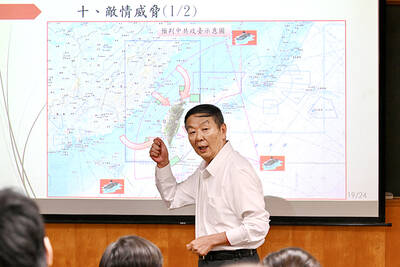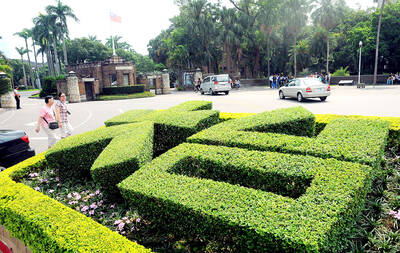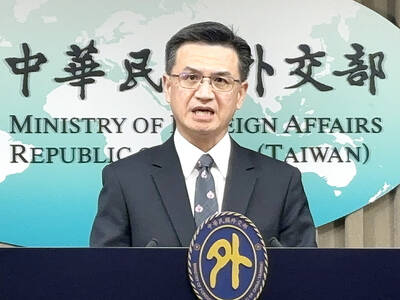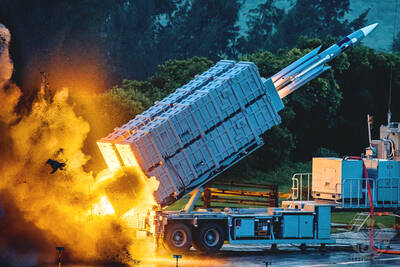Taipei Times: How do you intend to operate in your position as the secretary-general of the Presidential Office? Will things be different from the past?
Chang Chun-hsiung (張俊雄): The Presidential Office was previously not open to the public -- even reporters had difficulty covering news from there. This was caused by the outgoing ruling party, the KMT. Because President-elect Chen Shui-bian (陳水扁) won the race through a competitive process, he will do things differently than KMT presidents. Chen brought up many different political views during the campaign and now he must cash these "checks." The Presidential Office therefore has to communicate and negotiate with the Cabinet as well as the legislature, to promote Chen's political views.
As secretary-general, I will have to plunge into these affairs to the best of my abilities. I hope those who voted for Chen will feel good about their choice, while those who opposed him can change their mind and support him in the next election.
Although Vice President-elect Annette Lu (
TT: Following Chen's announcement that he would not participate in party-related affairs, what is the relationship likely to be like between Chen and the DPP? Will the DPP support Chen's hold on the reins of government?
Chang: Chen declared that he would stay out of party affairs -- which does not mean he is not important for the DPP. On the contrary, Chen's opinions on party reform will prove decisive [for the party].
The DPP was the opposition in the past, but now it has been transformed into the ruling party. The party must justify both its role and organization. One of the crucial aims for party reform, therefore, is undoubtedly to support Chen.
TT: You have criticized the current Cabinet for appearing to "resist" the transfer of power to the new government. How did that happen?
Chang: After the election, President Lee Teng-hui (
I therefore had to become a "bad guy" to urge the Cabinet to speed up the transfer. Attitudes appear to have improved since then.
TT: Which aspects of such procedures do you think need to be legislated?
Chang: First of all, government officials need to understand the concept of "being a responsible ruler and a decent administrator." I would ask that when those officials brief me, they should explain right away what kind of crises could occur in their ministries both now and in future -- and what measures they would take to solve such crises. If they handed over that kind of knowledge and experience first, then we could discuss which laws and regulations still need to be written.
Examples from other countries are not always suited to Taiwan. In our situation, we need to pass some new laws regarding important controversial issues, government budgets, the transfer of government personnel and classified documents.
The outgoing government needs to practice self-control before we can have the necessary laws and regulations.
TT: Chen made many promises to voters during the campaign. Have you listed the policy priorities for the new government?
Chang: We have only one and a half years [before the next legislative election in December 2001] to prove that people made the correct choice in voting for Chen. So we will work to accomplish three important missions -- terminate "black-gold" politics, complete 921 post-quake reconstruction and improve the efficiency of the central government.
In addition, we must successfully prevent vote-buying in the legislative elections.
TT: Annette Lu has made controversial remarks about her fight for what she has called her "constitutional rights" after the election. She even criticized Chen. How do you handle this situation? Are there still tensions between Lu and Chen?
Chang: I use the phrase "human nature" in observing the relationship between Chen and Lu. Lu has suffered so much hardship since the Kaohsiung Incident 20 years ago and she is still devoted to Taiwan's democratic reform. We should give her a period of time to adjust to the role she should play.
I think Lu's remarks could well become the sort of thing people might gossip about, but the relationship between Chen and Lu will never influence the new government's operations.

RETHINK? The defense ministry and Navy Command Headquarters could take over the indigenous submarine project and change its production timeline, a source said Admiral Huang Shu-kuang’s (黃曙光) resignation as head of the Indigenous Submarine Program and as a member of the National Security Council could affect the production of submarines, a source said yesterday. Huang in a statement last night said he had decided to resign due to national security concerns while expressing the hope that it would put a stop to political wrangling that only undermines the advancement of the nation’s defense capabilities. Taiwan People’s Party Legislator Vivian Huang (黃珊珊) yesterday said that the admiral, her older brother, felt it was time for him to step down and that he had completed what he

Taiwan has experienced its most significant improvement in the QS World University Rankings by Subject, data provided on Sunday by international higher education analyst Quacquarelli Symonds (QS) showed. Compared with last year’s edition of the rankings, which measure academic excellence and influence, Taiwanese universities made great improvements in the H Index metric, which evaluates research productivity and its impact, with a notable 30 percent increase overall, QS said. Taiwanese universities also made notable progress in the Citations per Paper metric, which measures the impact of research, achieving a 13 percent increase. Taiwanese universities gained 10 percent in Academic Reputation, but declined 18 percent

BULLY TACTICS: Beijing has continued its incursions into Taiwan’s airspace even as Xi Jinping talked about Taiwan being part of the Chinese family and nation China should stop its coercion of Taiwan and respect mainstream public opinion in Taiwan about sovereignty if its expression of goodwill is genuine, the Ministry of Foreign Affairs (MOFA) said yesterday. Ministry spokesman Jeff Liu (劉永健) made the comment in response to media queries about a meeting between former president Ma Ying-jeou (馬英九) and Chinese President Xi Jinping (習近平) the previous day. Ma voiced support for the so-called “1992 consensus,” while Xi said that although the two sides of the Taiwan Strait have “different systems,” this does not change the fact that they are “part of the same country,” and that “external

UNDER DISCUSSION: The combatant command would integrate fast attack boat and anti-ship missile groups to defend waters closest to the coastline, a source said The military could establish a new combatant command as early as 2026, which would be tasked with defending Taiwan’s territorial waters 24 nautical miles (44.4km) from the nation’s coastline, a source familiar with the matter said yesterday. The new command, which would fall under the Naval Command Headquarters, would be led by a vice admiral and integrate existing fast attack boat and anti-ship missile groups, along with the Naval Maritime Surveillance and Reconnaissance Command, said the source, who asked to remain anonymous. It could be launched by 2026, but details are being discussed and no final timetable has been announced, the source